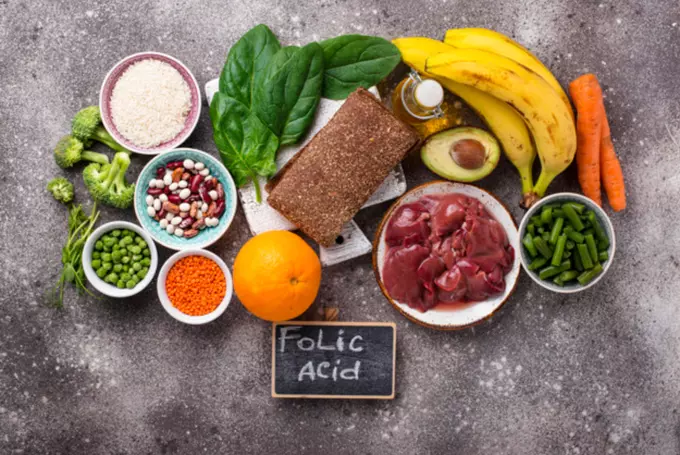Commonly referred to as Folic Acid, Vitamin B9 is a water-soluble nutrient that works in combination with Vitamins B6 and B 12. It is one of the eight B vitamins (also known as B complex) and is essential for forming DNA and protein metabolism.
Upon being consumed, Vitamin B9 is converted into a metabolically active form, i.e. tetrahydrofolate derivative, so that the body can efficiently utilise it. This conversion takes place in the liver with the help of an enzyme called dihydrofolate reductase. The body does not store folic acid, and the excess folate is excreted via urine.
Let us understand the importance of Vitamin B9 for our body, where we can get it from, and the recommended daily dosage.
Importance Of Vitamin B9
Vitamin B9 is one of the most important and essential compounds required for our body’s proper maintenance and functioning.
- Folic acid plays a significant role in forming cells and the synthesis of DNA, which acts as the building block of the body.
- It acts as a receptor and donor of single carbon units such as methane during amino acid metabolism.
- Studies have linked the consumption of Vitamin B9 to a reduced risk of developing cancer. It has also been noted to slow down cancerous growths on the colon called polyps.
- Folic acid, along with Vitamins B6 and B12, converts homocysteine to methionine, which helps in the formation of protein.
- Increased consumption of folic acid has been shown to reduce the body’s homocysteine levels, leading to a reduced risk of developing cardiovascular diseases.
- Research has linked the supplementation of folic acid to increased cognitive functioning and reduced risk of developing dementia.
- Consumption of folic acid aids the repair and development of tissues.
- Consuming Vitamin B9 before and during pregnancy helps in preventing the neural tube irregularities of the fetus.
- Studies have correlated the increased consumption of Vitamin B9 to a decreased risk of experiencing depression. It was also observed that folic acid effectively boosted the properties of depression medication.
- Folic acid aids S-adenosylmethionine production (SAMe), which acts as a methyl donor for the body.
It has also been shown that the consumption of Vitamin B9 has a considerable role in maintaining mental and emotional health. It regulates the chemical release of hormones inside the brain.
Sources Of Vitamin B9
Given below is a list of foods that are high in folic acid or folate:
- Legumes/Lentils: One cup of cooked legumes contains 131 mcg of Vitamin B9. They are also an excellent source of protein, fibre, potassium, phosphorus, and almost no saturated fats. Consumption of legumes helps strengthen muscle and has been linked to aiding the prevention of diabetes and cancer.
- Eggs: One large egg packs about 22 mcg of folate. Eggs are also a rich source of protein, calcium, riboflavin and Vitamin B12. The consumption of eggs has been linked to reduced cholesterol levels, improved immune system and the prevention of potential cardiovascular diseases.
- Leafy Greens: Leafy greens such as spinach, amaranth, and kale are very high in folate. For example, a bowl of spinach packs about 59 mcg of Vitamin B9. Research has linked the increased consumption of leafy greens with boosted metabolism, weight loss, reduced inflammation, and cancer prevention.
- Broccoli: A cup of broccoli contains about 57 mcg of Vitamin B9. It is also a rich source of nutrients like Vitamin V12, Vitamin K, and iron. The consumption of broccoli helps in the prevention of cancer and aids proper maintenance of eye health.
- Asparagus: Half a cup of asparagus contains 134 mcg of folic acid. It is also a rich source of fibre, potassium and antioxidants. Studies have linked increased consumption of asparagus to healthier digestion, weight loss and more uncomplicated pregnancies.
- Brussels Sprouts: A cup of cooked brussels sprouts contains 47 mcg of Vitamin B9. It is also a rich source of Vitamin C, manganese and protein. Consumption of brussels sprouts has been linked to a reduced risk of inflammation, cancer prevention, and an improved immune system.
- Papayas: A cup of papaya contains about 53 mcg of folic acid. It is also a rich source of Vitamin C, potassium and antioxidants. Along with reducing oxidative stress, papayas have been linked to improved memory power and anti-inflammatory effects on the body.
- Beef Liver: Beef liver has the highest concentrated source of Vitamin B9. A three-ounce serving of beef liver packs about 212 mcg of folic acid. It is also a rich source of Vitamin A, potassium, protein, and copper. Consumption of beef liver is essential for the production of enzymes and regulation of kidney and brain health.
- Bananas: A medium-sized banana packs about 24 grams of folate. It is also a rich source of Vitamin A, manganese and potassium. Consumption of bananas improves gastrointestinal health, lowers cholesterol and supports cardiovascular health.
- Avocados: Half an avocado contains 82 mcg of Vitamin B9. It is also a rich potassium source, Vitamin B6 and Vitamin K. Avocados are also a good source of monounsaturated fats. Studies have linked increased consumption of avocados to a reduced risk of developing cardiovascular diseases and cancer.
- Health Supplements: Health supplements like HealthKart Iron + Folic Acidare the most effective source of Vitamin B9. A single capsule contains about 117 mcg of Folic Acid. It is also a rich source of biotin, Vitamins B1, B2, B3 and various other nutrients. Consumption of health supplements aids the overall development of the body. It boosts the immune system in a single go, eliminating the need to calculate the vitamin levels of your food intake and regulating your diet based on that.
Dosage Of Vitamin B9
The minimum recommended amount (also known as daily value) for vitamin B9 per day is estimated to be 400 mcg with an upper limit of 800 mcg. However, it is always advisable to consult a doctor regarding your Vitamin B9 intake requirements as the numbers differ from individual to individual, as per their specific body compositions.
Given below is a chart that helps identify the recommended daily intake of Vitamin B9 per day based on the age of the individual:
| Age | Recommended amount |
| 0–6 months | 65 mcg DFE |
| 7–12 months | 80 mcg DFE |
| 1–3 years | 150 mcg DFE |
| 4–8 years | 200 mcg DFE |
| 9–13 years | 300 mcg DFE |
| 14–18 years | 400 mcg DFE |
| 19+ years | 400 mcg DFE |
| Pregnant Women | 600 mcg DFE |
Deficiency Of Folic Acid
The deficiency of folic acid can give rise to folic acid deficiency anaemia, a condition characterised by the total lack of red blood cells to transport oxygen from the lungs to the rest of the body. This is likely due to the lack of haemoglobin. Individuals who suffer from folate anaemia exhibit symptoms such as :
- Reduced or no sense of taste.
- Regression in mental state, leading to depression.
- Weakness in bones and muscles.
- Numbness in limbs.
- Diarrhoea
Not only are pregnant women at a higher risk of developing folate anaemia, but they are also more likely to experience placental abruptions due to lack of folic acid intake.
This can be remedied by making specific changes to your lifestyle, such as following an exercise regimen, consuming folic acid sources as mentioned above, along with nutritional supplements as a part of a healthy balanced diet, etc.
Excessive Consumption Of Folic Acid
While Vitamin B9 is vital to the proper functioning of our body, consuming more than the recommended intake, or in large amounts (more than 1000 mg per day) can backfire on the body by causing complications such as :
- Slowing down cognitive development, especially in children
- While folic acid can be beneficial to cancer prevention, those already diagnosed with cancer can experience worsening symptoms if supplemented with more than 10000 mcg of Vitamin B9 per day.
- Excessive folic acid consumption tends to mask any potential deficiency of Vitamin B12, causing it to go unnoticed. This deficiency, if left unchecked, can give rise to severe mental and cardiovascular complications in the long run.
- Excessive consumption of folates has been linked to the acceleration of age-related cognitive decline, giving rise to complications such as early-onset dementia, Alzheimer’s, etc.
In this fast-paced and strenuous modern lifestyle, it is difficult and impractical to maintain an accurate record of our food intake and calculate how much Folic Acid we are getting out of it. Therefore, folic acid supplementations as suggested by our medical advisors is a great way to maintain a balanced nutritional intake for good health.
Popular Searches
Hair Growth Tips | Jasmine Oil Benefits For Hair | Sorbitol Benefits For Hair | Leucine Benefits For Hair | Royal Jelly Benefits | Herbal Hair Oil Benefits | Rice Starch Benefits | Whey Vs Plant Protein | Exercise To Reduce Belly Fat | Vitamin B12 Benefits And Side Effects | Foods Rich In Biotin | Iron Rich Foods



